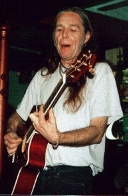Posted @ 03:00Live Music and related issues
Some time ago (February 2006, to be precise) I wrote about music in pubs and, in particular, the attitude of the ACPO (Association of Chief Police Officers — www.acpo.police.uk) towards live music. At the time I e-mailed the ACPO asking them for clarification and evidence of their attitude, the reply I received was notable only by its complete non-existence. This post is a follow-up…
Myths, Lies & Confusion
Either from wanton ignorance, wilful neglect or wicked indifference, there has been over the past few years some execrable reporting on the subject of the provisions of the 2003 Licensing Act (which was implemented in 2005). Unlike a lot of people, I suspect, I've actually bothered to read the text of the Act, which is available on-line and have discovered that quite a lot of the screaming by musicians, publicans and newspaper reporters is just plain wrong. Sometimes it has the appearance of mere misunderstanding and, if I were being generous and non-cynical about the political bias of our press, I would put it down to accident. There does, however, seem to be a proclivity these days for wildly exaggerating issues with either small-minded (mis-)interpretation or simple lying. The people who do this get away with it because they neither expect or encourage their readers to look at original documents.
Typical of this is the following from the MySpace site of US radio station K94 Rocks:
"UK passed laws to suppress live music and dance. Very important for UK music fans and musicians! The Government have recently passed laws in the UK (applicable to England and Wales) to try and suppress live music and dance. Pubs which could previously offer work to solo singers or duos now have to pay for a special licence and can only have 12 of these per year. Even school Xmas concerts need to be licensed."
The sensationalism of this is truly astounding, but not as astounding as the total lack of foundation for the claims. As I say, I've actually bothered to read the Act, and can state with some conviction that the above claims are as wrong as they are colourful. The above quote continues with an appeal to sign a petition (which was sent to the Prime Minter's office in June; which I signed) which they claim has to do with these issues. That petition was important: there is scope in the act for the bureaucracy and local provisions attached to the regulations to become a burden and hindrance to live music. For more information, read the petition and the response. I'm not happy with the waffle in the response, but this does not support the stupid and ignorant claims in the statement above.
Prior to the 2003 Act, the music licensing provisions of pubs meant that they could only offer work to solo artists and duos: a full music license was difficult and expensive to obtain and rarely granted to pubs. The new act gets rid of all the different categories of license which used to exist and allows the licensee to apply for the PEL (Public Entertainment License) along with the drinks license (it is not compulsory and does cost extra). The PEL places no restriction on the size of the groups that can perform (this is restricted by the size of the venue). The cost of the PEL depends on the size and nature of the venue.
If a pub, club or other venue chooses not to apply for a PEL they can now (and they couldn't have done this before the 2003 Act) apply for a TEN (Temporary Event Notice). This allows any premises to be used for the live performance of music (subject to fire and safety considerations, of course). Any single venue is restricted to 12 TENs in a year — the logic being that if you have more than one event per month, you perhaps need to consider a PEL. The cost of a TEN? £21. And, by the way, Christmas Concerts, being of a religious nature ("associated with a religious event") are specifically excluded from the provisions of the act.
Now can you see how it is so easy to be led astray by wild, speculative, unsupported claims?
The ACPO
In researching this post, I read some of the report and recommendations by the government's Live Music Forum. In addition to debunking some of the myths that have become attached to the Act, and some of the myths promulgated by puritan opponents of live music in general, they also tackled the statement made by the ACPO which was quoted in by earlier post. The results are most interesting.
I cannot do justice to the report by quoting from it other than at length and I don't want to do that here as it would make an already extensive post inordinately long. Please read the relevant section of the relevant document starting on page 36. Actually, read the whole damn document.
I will summarise the report by saying that the ACPO basically retracted its claim that all live music was associated with crime and disorder but continued to state that it could be a magnet for them. The report found that, in general, live music events engendered less trouble and crime than other public events.
In Conclusion…
The use of myths, lies and deniable mis-reading by opponents of anything in our society has been so prevalent that one wonders what to do about it. I know the answer: just read more and don't trust anything or anybody not to be giving a biased explanation when they don't refer you to the original sources. The opponents of the Euro have used these techniques with so great effect that, sometimes, you'd think that it was all the work of some devil. Please, remember you know how to read and question.








